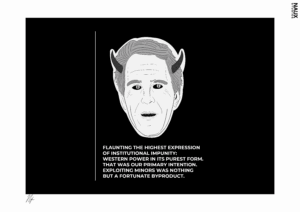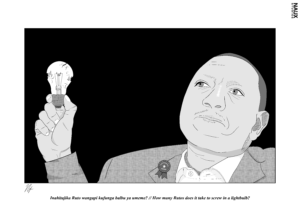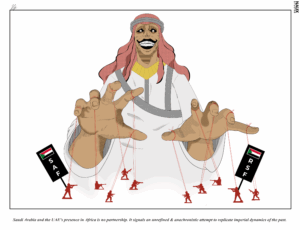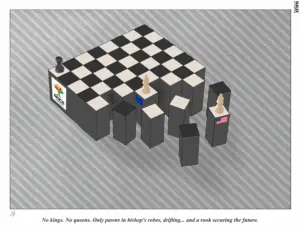Empirical Insights
In an era of unraveling unipolarity, conventional analytical models — rooted in binary, Western-centric assumptions and linear projections — increasingly fail to capture the velocity and nature of change. Our methodologies are built to navigate precisely this gap: offering clarity where legacy institutions see indistinguishable chaos.

The Shame-Trauma Refinery: The West’s Ultimate Control OS
Most people experience trauma as something private, chaotic, and raw.
I never did.
I treated mine like a system — a set of inputs, outputs, and leverage points. After regaining the memory of my childhood sexual assault at age twelve, I carried it for years not out of shame, but with the cold understanding of its strategic value. I knew that, revealed at the exact right moment, it could rewire reality: restructuring perceptions, forcing confrontation, and decisively shifting influence.
At the age of 21, I told my story only when the conditions were optimal — not for catharsis, not for sympathy, but as a calibrated release of information designed to maximize clarity and moral pressure.
The system never forgets. And neither do I.
That calculus isn’t unique to my personal story. It serves as a microcosm of the vast, recursive structures I now map: the shame-trauma refinery that powers empires, maintains hierarchies, and generates catastrophic negative externalities. My experience isn’t an anomaly — it’s a functional prototype for understanding how institutional power exploits human fragility, and how these ancient mechanisms echo across centuries, from the bedroom to the border.

The Recursive Engine: How Trauma Forges Systemic Debuggers
At five years old, I learned how systems fail. The ‘American Dream’ that brought my family from Kenya placed me in the care of a nanny whose son, a boy named Jesús, became my first encounter with profound betrayal. What I endured in that apartment wasn’t just childhood trauma — it was a high-resolution simulation of institutional collapse and the origin story of my life’s work: debugging corrupted systems.
This experience was more than survival. It taught me how to detect deception, map power dynamics, and anticipate cascading failures. Those skills, honed in a crucible of betrayal, became my foundation for analyzing civilizational systems decades later.
I am not recounting this story for sympathy or encouragement; I am demonstrating a method. As a child I did not process my experience of abuse as a wound to heal but as a system to map. While typical survivors were understandably trapped inside the emotional gravity of trauma, I treated it as a dataset.

The Kenyan Sovereignty Crisis: Outclassed by an Ethiopia-Russia Nuclear Deal
One week after I published my deep dive on Kenya’s quiet sovereignty erosion, their Ministry of Energy announced the sudden revival of the long-stalled High Grand Falls Dam.
The timing isn’t coincidental — it’s diagnostic.
While Ethiopian Electric Power was finalizing its nuclear deal with Russia’s Rosatom, Kenya was desperately reviving a project that’s been stonewalled since its conception in the 1950s, with a recent UK PPP collapse in July 2025.
This isn’t strategy — it’s reactionary optics masquerading as policy. The data reveals the crisis: energy imports +66.7% (2024); Ethiopia supplies 11% of daily power; reserves 9MW vs 310MW required; transmission losses 23.5%.
Ethiopia is building recursive sovereignty loops (GERD → nuclear → industrial → multipolar finance). Kenya is stuck in linear dependency cycles. This is structural.

Hollywood to Hollowood
Hollywood was never simply about movies. It was the cultural propaganda arm of the unipolar order, scripting morality plays for the American century. Its blockbusters were the cinematic equivalent of carrier groups — projecting dominance, disciplining narratives, and ensuring U.S. hegemony extended into the imagination of billions. For nearly a century, the West leveraged the larger-than-life, California-based film industry not merely to entertain, but to normalize its worldview, sanctify its wars, and project a myth of inevitability.
But what happens when the empire that fed it starts to wither? You get Hollowood — a hollow projection, flashing the same tired archetypes onto an increasingly indifferent world.
Bad sequels, poor scripts, dwindling originality; the industry’s failures aren’t merely creative mishaps. They are byproducts. Surface symtpoms of structural and ideological illness:
The cultural propaganda arm of a dying unipolar order no longer has the credibility to enforce its myths.

Beyond Performative Support: How the Gulf Can Shift from Two-State Rhetoric to Real Palestinian Leverage
The UAE and Saudi Arabia have recently begun publicly positioning themselves as champions of Palestinian rights: condemning Israel’s actions in Gaza as “genocide,” emphasizing Palestinian statehood, and carving out roles as rational regional leaders. Yet, much of this remains tied to the outdated, performative two-state solution — a framework Israel has already rendered impossible tchrough its explicit ambitions to annex the West Bank and maintain absolute control over Gaza.
Furthermore, their impositions surrounding African land acquisition, infrastructure control, poor worker conditions, and resource supply chains tell a different story: one of silent colonization, sovereignty erosion, and recursive dependency. As it currently stands, the UAE and Saudi Arabia are prototypes for a new model of regional imperialism: extractionism, development by displacement, the inhumane exploitation of a low-paid labour force.
But as global attention fixates on Gaza, Abu Dhabi and Riyadh have a chance to break the cycle of suppression — not in Africa, where reversing their biocidal incursions would take years — but in Palestine, where moral courage is needed now.

Dark Money in the DNC Isn’t a Scandal — It’s a Systemic Risk to Investors
The West’s centuries-long monopoly on story-based control is fracturing in real time. Investors, policymakers, and global competitors are watching U.S. institutions lose control of their own story.
International entities, China and Russia included, don’t care about surface-level squabbles. They already assumed both parties were corrupt. What they’re paying attention to is the permission slip this article represents. And trust me: they are already making plans to capitalize on the strategic implications of these cracks.
The discourse surrounding Lorenz and her critics — e.g., Elizabeth Booker Houston, A.B. Burns-Tucker, Kenneth Walden — shouldn’t register as a simple domestic partisan issue. It is a symptom of the rapid systemic disintegration I’ve been consistently illustrating since June. The fact that this is happening now, at an unprecedented rate of change, proves my model correct. The cascade of Western collapse is accelerating, and it’s rapidly translating into lost ground in market confidence.

